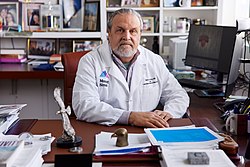Research
According to published works, Charney's research is centered around various fields such as psychiatry, anesthesia, clinical psychology, and major depressive disorder. In recognition of his significant contributions to new treatments for mood and anxiety disorders, including the use of ketamine for resistant depression, Charney received the Donald Klein Lifetime Achievement Award from the American Society for Psychopharmacology in 2023. [10]
Ketamine treatment development
Neuron published that Charney's neurobiological insights into ketamine are a novel approach to the underlying operation of mechanism-of-action for rapid-acting antidepressant efficacy and mood disorders [11] and is the first model of a rapid-acting antidepressant with efficacy for treatment-resistant symptoms of mood disorders. His intranasal ketamine treatment was approved by the FDA in 2019 and now produced under the brand name Spravato. [12] Scientific American published in 2018 that the development is the first new form of antidepressant since the 1950s. [13]
General
General psychiatry research includes work on anxiety, mood and psychopathology linked to work in injury prevention, [14] thereby connecting myriad disciplines of study. Research into depression shows elements of internal medicine and management. Clinical psychology includes psychological intervention and resilience. Research shows themes of randomized controlled trials and Esketamine. [15] Traumatic stress, anxiety and neuroscience [16] is part of his psychology study and is frequently connected to suicide prevention, bridging the gap between various science disciplines and establishing new relationships. Other areas of study are bipolar disorder, endocrinology and oncology.
Charney's research on digital mental health research contributed to the development of Rejoyn, the first FDA-approved prescription digital therapeutic for major depressive disorder (MDD). The treatment is designed to be used alongside standard care and medication to help reduce MDD symptoms. [17] [18] [19] [20]
Affiliations and positions
- Principal investigator, VA National Center for Post-traumatic Stress Disorder and the NIMH Yale Mental Health Clinical Research Center.
- Member, Food and Drug Administration Psychopharmacologic Drug Advisory Committee
- Editorial committee, Biological Psychiatry, a publication of the Society of Biological Psychiatry [25]
- Former chair, Board of Scientific Counselors for the National Institute of Mental Health
- Former chair, scientific advisory board of the Anxiety Disorders Association of America (ADAA)
- Former chair, Depression and Bipolar Support Alliance (DBSA) Scientific Advisory Board
- Past president, American College of Neuropsychopharmacology [26]
- Member, Scientific Advisory Board of the National Alliance for Research on Schizophrenia and Depression (NARSAD, now known as the Brain & Behavior Research Foundation)
- Member, National Alliance for the Mentally Ill (NAMI)
- Former scientific director, NIMH Strategic Plan for Mood Disorder Research in 2002. [27]
Awards and honors
Partial list:
- 2023 Donald Klein Lifetime Achievement Award, American Society for Psychopharmacology [10] [28]
- 2023 Rhoda & Bernard Sarnat International Prize in Mental Health [29]
- 2019 Colvin Prize for Outstanding Achievement in Mood Disorders Research [30]
- 2017 Ketamine for Treatment-Resistant Depression – Named One of Top 10 on 2017 Health Care Innovations List [31]
- 2017 American Heart Association Heart of Gold Award [32] [33]
- 2017 - Fellow, National Academy of Inventors [2]
- 2015 The World's Most Influential Minds [34]
- 2014 Distinguished Alumni Award from the Pennsylvania State University School of Medicine [35]
- 2014 The World's Most Influential Scientific Minds [36]
- 2009 ACNP Julius Axelrod Mentorship Award [37]
- 2006 The Gold Medal Award from the Society of Biological Psychiatry [38]
- 2004 Research and Mood Disorders – American College of Psychiatrists
- 2004 CINP-Lilly Neuroscience Clinical Research Award
- 2004 The American Psychiatric Association Award for Research [39]
- 2000 Election, National Academy of Medicine
- 1999 The American College of Psychiatrists Award for Depression Research
- 1999 The Edward J. Sacher Award from Columbia University
- 1999 The Gerald L. Klerman Lifetime Achievement Award from the Depression and Bipolar Support Alliance (DBSA) [40]
- 1994–1995 Anna Monika Foundation Award for Research in Affective Disorders [41]
- 1992 Daniel H. Efron Research Award from the American College of Neuropsychopharmacology [42]
- 2014–2015 Distinguished Alumni Award, Pennsylvania State University [4]
Personal life
Charney is the father of five children and grandfather of eight. On the morning of August 29, 2016, Charney was shot and wounded by Hengjun Chao, as Charney left Lange's Deli in Charney's hometown of Chappaqua, [43] New York. Chao was a former Mount Sinai medical researcher who had been fired by Charney in 2010 for research fraud. [44] [45] [46] Chao's trial began on June 5, 2017, and eight days later Chao was convicted of attempted second-degree murder and two other charges in Westchester County Court in White Plains. He was sentenced to 28 years in prison. [47] [48] [49] [50] [51] These personal events contributed first-hand to his study of resilience and are discussed in this his book "Resilience". [52] [53]
